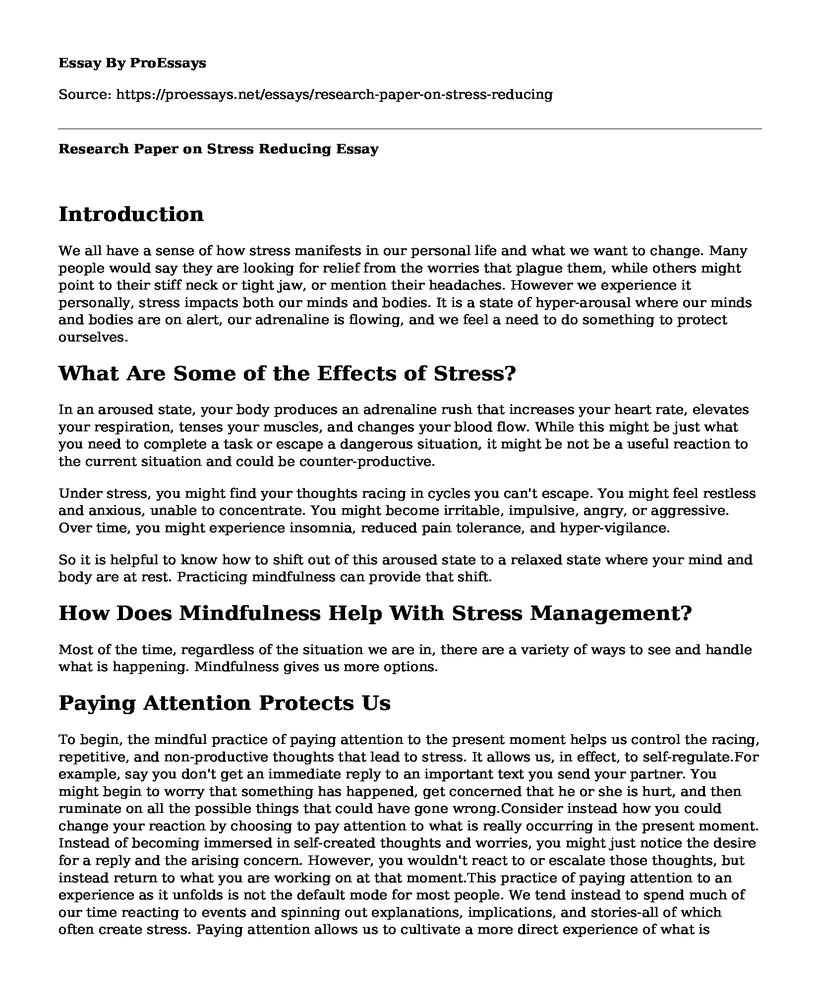Introduction
We all have a sense of how stress manifests in our personal life and what we want to change. Many people would say they are looking for relief from the worries that plague them, while others might point to their stiff neck or tight jaw, or mention their headaches. However we experience it personally, stress impacts both our minds and bodies. It is a state of hyper-arousal where our minds and bodies are on alert, our adrenaline is flowing, and we feel a need to do something to protect ourselves.
What Are Some of the Effects of Stress?
In an aroused state, your body produces an adrenaline rush that increases your heart rate, elevates your respiration, tenses your muscles, and changes your blood flow. While this might be just what you need to complete a task or escape a dangerous situation, it might be not be a useful reaction to the current situation and could be counter-productive.
Under stress, you might find your thoughts racing in cycles you can't escape. You might feel restless and anxious, unable to concentrate. You might become irritable, impulsive, angry, or aggressive. Over time, you might experience insomnia, reduced pain tolerance, and hyper-vigilance.
So it is helpful to know how to shift out of this aroused state to a relaxed state where your mind and body are at rest. Practicing mindfulness can provide that shift.
How Does Mindfulness Help With Stress Management?
Most of the time, regardless of the situation we are in, there are a variety of ways to see and handle what is happening. Mindfulness gives us more options.
Paying Attention Protects Us
To begin, the mindful practice of paying attention to the present moment helps us control the racing, repetitive, and non-productive thoughts that lead to stress. It allows us, in effect, to self-regulate.For example, say you don't get an immediate reply to an important text you send your partner. You might begin to worry that something has happened, get concerned that he or she is hurt, and then ruminate on all the possible things that could have gone wrong.Consider instead how you could change your reaction by choosing to pay attention to what is really occurring in the present moment. Instead of becoming immersed in self-created thoughts and worries, you might just notice the desire for a reply and the arising concern. However, you wouldn't react to or escalate those thoughts, but instead return to what you are working on at that moment.This practice of paying attention to an experience as it unfolds is not the default mode for most people. We tend instead to spend much of our time reacting to events and spinning out explanations, implications, and stories-all of which often create stress. Paying attention allows us to cultivate a more direct experience of what is happening and nothing more.
An Open Attitude Provides Relief
Another aspect of mindfulness is an attitude of curiosity and acceptance to whatever is occurring. In our example, when you don't get a reply to your text, you could accept that there may be many reasons why. You might be curious as to whether your partner thought the text was as important as you did.
According to psychologist Scott Bishop, who has researched the impact of mindfulness on our mental wellbeing, the practice of paying attention with an open attitude leads to a decrease in rumination and avoidance strategies, both of which underlie anxiety. An open attitude leads to a greater acceptance of what is happening, improved ability to tolerate difficult situations, and a lessening of reactivity and repetitive negative thinkingMindfulness creates a new relationship to experiences
According to some psychologists, the core mindful practices of intention, attention, and attitude lead to a fundamental shift in perspective they "reperceiving." Reperceiving allows us to dis-identify from thoughts, emotions, and body sensations as they arise, and simply be with them instead of being controlled or defined by them. We realize, "this worry is not me," or "these thoughts are not me," which cultivates the ability to see a situation as it really is. As we do this more and more, our confidence in our ability to cope grows, and we are less likely to become stressed by events that would have previously felt like a threat.
Cite this page
Research Paper on Stress Reducing. (2022, Aug 15). Retrieved from https://proessays.net/essays/research-paper-on-stress-reducing
If you are the original author of this essay and no longer wish to have it published on the ProEssays website, please click below to request its removal:
- Psychiatric Disorders: Reflection Questions
- The Impact of PTSD on Veterans' Family Relationships: An Interpretative Phenomenological Inquiry
- Research Paper on Homeless Individuals With Schizophrenia
- Essay on Schizophrenia: Professional Orientation and Ethics
- Essay Example on Leadership: An Essential Trait for Achieving Goals & Objectives
- Paper Sample on Growing Up: A Child's Evolving Perception of Parents
- Five-Factor Model of Personality - Research Paper Sample







